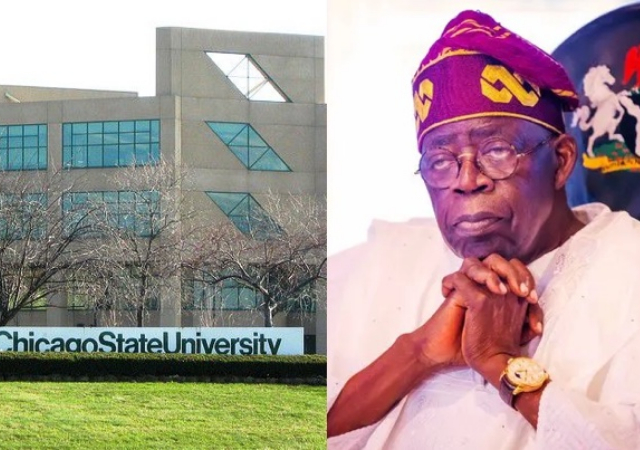The registrar of Chicago State University, Caleb Westberg, has made a startling revelation, stating that the university did not issue the certificate presented by Mr. Tinubu to the Independent National Electoral Commission (INEC) on July 17, 2022.
According to a report by Peoples Gazette, Mr. Westberg, who has held the position of CSU’s registrar since November 2020, affirmed during a deposition lasting approximately 5.5 hours that Mr. Tinubu neither applied for a replacement certificate nor received one. This unequivocal statement marked a significant milestone in the months-long legal battle initiated by Atiku Abubakar, Mr. Tinubu’s primary political opponent. Mr. Abubakar had approached the United States District Court for the Northern District of Illinois in Chicago to ascertain the authenticity of the document.
Federal district judge Nancy Maldonado granted a final order for CSU administrators to disclose all documents related to Mr. Tinubu and to participate in a deposition conducted by Mr. Abubakar’s legal team.
In response to these developments, Mr. Tinubu, recognizing the potentially dire consequences, vehemently opposed the proceedings. His legal team warned the judge during a hearing on September 21 that releasing the documents and deposition would inflict severe and irreparable harm on the Nigerian president.
The issue of Mr. Tinubu’s educational credentials had long been a matter of contention. While the school previously maintained that he was a student, having enrolled in 1977 and graduated in 1979, the inability to authenticate the certificate he submitted to INEC had profound implications for Nigeria’s population of over 200 million.
In 1999, Mr. Tinubu had sworn under oath when running for the governorship of Lagos, claiming to hold a degree from the prestigious University of Chicago. However, he escaped accountability for this claim as he was elected before the discrepancy was discovered, and he did not submit a certificate to support his assertion. Instead, he presented an affidavit that was later found to be fictitious. The Nigerian Supreme Court ruled that he could not be charged with crimes while serving as governor. Subsequently, he ceased to assert attendance at the University of Chicago and instead claimed to have attended Chicago State University, a campus under the umbrella of Illinois State University, which is traditionally popular among the Black community.
After conducting a thorough comparison between the certificate issued by CSU and the one Mr. Tinubu submitted to INEC, Mr. Enahoro-Ebah returned to Nigeria with the records and filed a forgery complaint against Mr. Tinubu. Unfortunately, the case languished in an Abuja court for months leading up to the election and remained unresolved even months after the election.
Mr. Atiku utilized these conflicting records as the basis for seeking a subpoena from the federal court in Chicago as part of his ongoing case against Mr. Tinubu in Nigeria. This culminated in the deposition conducted on Tuesday, which established that Mr. Tinubu had forged his certificate, constituting a violation of the Nigerian Constitution.
Mr. Tinubu was declared the narrow winner of the presidential election held on February 25, and he was sworn in on May 29. However, the latest development could spell the end of his presidency due to the constitutional prohibition against presenting a forged certificate to the electoral authorities.
Section 137(1)(j) of the Nigerian Constitution (amended in 2010) explicitly states that no one can legitimately hold the office of President of Nigeria if they have presented a forged certificate to the Independent National Electoral Commission.










More Stories
20 Kano contingents die in auto crash on return from Gateway Games
Natasha’s arraignment: Ezekwesili fires memo to Tinubu, urges him to halt desecration of democracy
Niger Govt confirms 151 dead bodies recovered after torrential rain swept away 265 houses